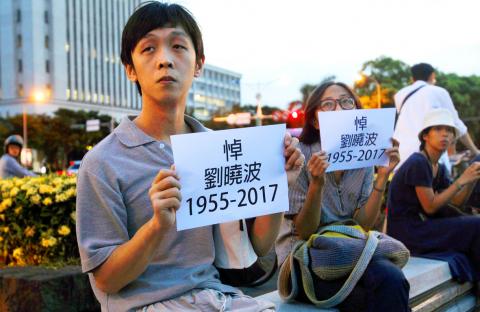A commemorative event was held in Taipei last night to mourn the passing of Chinese Nobel Peace Prize laureate Liu Xiaobo (劉曉波) as politicians stressed the importance of democracy and human rights.
Liu, sentenced to 11 years in jail in 2009 for “inciting subversion of state power” after he helped write a petition entitled Charter 08, which called for sweeping political reforms, died on Thursday after battling liver cancer. He was 61.
The commemoration, held in Liberty Square, was initiated by the New School for Democracy, an institution chaired by exiled Chinese democracy activist Wang Dan (王丹).

Photo: Chiang Ying-ying, AP
The group called for Beijing to release all those imprisoned for speaking out against the Chinese Communist Party.
Earlier, Kaohsiung Mayor Chen Chu (陳菊) said it was sad to hear of Liu’s passing, offering her condolences for Liu’s 28 years of house arrest and imprisonment, adding that “only those who have been in jail can understand.”
Chen herself served six years and two months in prison for her participation in the Formosa Incident, a pro-democracy demonstration organized by Formosa Magazine on Dec. 10, 1979.
“No one should be imprisoned for expressing a different view using any method,” she said. “Liu’s struggles and his adherence to his ideals reminds us that freedom and democracy do not fall out of the sky. Freedom and democracy cannot be retained without effort spent to safeguard it.”
Taipei Mayor Ko Wen-je (柯文哲) said that China is constantly criticized by other nations for being “barbaric” and that it should endeavor to improve its human rights record.
“Should China be willing, Taiwan is an excellent example of a success story and we hope that Chinese, one day, will enjoy freedom and democracy,” Ko said. “This is what [China] needs to work on.”
Former president Ma Ying-jeou (馬英九) wrote on Facebook that while the world mourned the passing of Liu, China should seek to improve its record on freedom and human rights, both to live up to its position as a “great power” and the “Chinese dream.”
Meanwhile, in response to President Tsai Ing-wen’s (蔡英文) remarks on Thursday that Taiwan hoped China could show self-confidence and promote political reform following the death of the Nobel laureate, Beijing yesterday accused Tsai of aggravating tension across the Taiwan Strait.
China’s Taiwan Affairs Office spokesman Ma Xiaoguang (馬曉光) was quoted by Xinhua news agency as saying that such “reckless” comments were “very dangerous” for cross-strait relations and were an example of Tsai’s “repeated arbitrary attacks.”
He said Tsai and the Democratic Progressive Party had “lifted the deceptive veil” of maintaining the “status quo” in cross-strait relations and that the repeated attacks were an attempt to regress ties to “tension and turbulence.”
“Such behavior is very dangerous,” he said, according to the Xinhua report, which was published only in English.
Additional reporting by Peng Wan-hsin and agencies

US President Donald Trump yesterday announced sweeping "reciprocal tariffs" on US trading partners, including a 32 percent tax on goods from Taiwan that is set to take effect on Wednesday. At a Rose Garden event, Trump declared a 10 percent baseline tax on imports from all countries, with the White House saying it would take effect on Saturday. Countries with larger trade surpluses with the US would face higher duties beginning on Wednesday, including Taiwan (32 percent), China (34 percent), Japan (24 percent), South Korea (25 percent), Vietnam (46 percent) and Thailand (36 percent). Canada and Mexico, the two largest US trading

China's military today said it began joint army, navy and rocket force exercises around Taiwan to "serve as a stern warning and powerful deterrent against Taiwanese independence," calling President William Lai (賴清德) a "parasite." The exercises come after Lai called Beijing a "foreign hostile force" last month. More than 10 Chinese military ships approached close to Taiwan's 24 nautical mile (44.4km) contiguous zone this morning and Taiwan sent its own warships to respond, two senior Taiwanese officials said. Taiwan has not yet detected any live fire by the Chinese military so far, one of the officials said. The drills took place after US Secretary

CHIP EXCEPTION: An official said that an exception for Taiwanese semiconductors would have a limited effect, as most are packaged in third nations before being sold The Executive Yuan yesterday decried US President Donald Trump’s 32 percent tariff on Taiwanese goods announced hours earlier as “unfair,” saying it would lodge a representation with Washington. The Cabinet in a statement described the pledged US tariffs, expected to take effect on Wednesday next week, as “deeply unreasonable” and “highly regrettable.” Cabinet spokeswoman Michelle Lee (李慧芝) said that the government would “lodge a solemn representation” with the US Trade Representative and continue negotiating with Washington to “ensure the interests of our nation and industries.” Trump at a news conference in Washington on Wednesday announced a 10 percent baseline tariff on most goods

THUGGISH BEHAVIOR: Encouraging people to report independence supporters is another intimidation tactic that threatens cross-strait peace, the state department said China setting up an online system for reporting “Taiwanese independence” advocates is an “irresponsible and reprehensible” act, a US government spokesperson said on Friday. “China’s call for private individuals to report on alleged ‘persecution or suppression’ by supposed ‘Taiwan independence henchmen and accomplices’ is irresponsible and reprehensible,” an unnamed US Department of State spokesperson told the Central News Agency in an e-mail. The move is part of Beijing’s “intimidation campaign” against Taiwan and its supporters, and is “threatening free speech around the world, destabilizing the Indo-Pacific region, and deliberately eroding the cross-strait status quo,” the spokesperson said. The Chinese Communist Party’s “threats